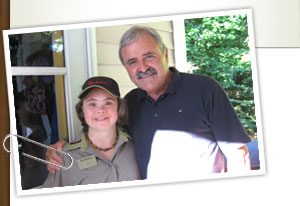Taking Risks
Taking Risks to Allow a Social Life
Most parents find it much more difficult to let their child who has a disability go off on his own with his peers than to allow their other children to do the same thing. Trying to moderate (with wisdom) one’s natural protective instincts is worth the effort.
How a Parent Facilitated Classmate Relationships
Josie hired Jonathan’s classmates to take him on weekend outings, or she invited them over to hang out with Jonathan when she and her husband went out. Today, these young people are still Jonathan’s friends–but she doesn’t need to pay them!
Download TranscriptIf a young person who has a disability is always given the message that they are not trusted to be on their own, they will likely have much more difficulty transitioning into adult life.
This is the paradox at the heart of raising Jonah—how much he depends on us to make him independent.
Joel Yanofsky, author of “Bad Animals: A father’s Accidental Education in Autism.”
This book by David Hingsburger gives advice and ideas for dealing with bullies for families, educators and young adults with intellectual disabilities. This document provides a brief description and a link to Diverse City Press, where other useful resources can be found.
Taking Risks with Short-Term Relationships
Some parents describe the hurt that their child has experienced when an intense short-term friendship ends. Quite often in circles of young people, this is the case, as youth tend to be mobile and are not necessarily good at staying in touch.
Parents may feel that unless a relationship has a good chance of becoming long-term it is not worth investing in it. However, like other young people, youth who have a disability can learn much about how to be a friend and can have fun as well in short-term relationships. Of course, the best assurance against your child being devastated by the loss of a friend is for them to have a network of friends.
At the same time, if you know in advance that a relationship will not be long-term, it is good to try to help your family member understand from the beginning that the relationship is temporary. Use the occasion to try to teach your young person about boundaries and help them understand that this person will not be in their inner circle—they are not someone to get too wrapped up in. If you know when the friend will be moving on, help your family member to mark off the months on a calendar. When the time comes, plan a send-off party together. Such good-bye rituals provide a sense of closure and can ease the transition.
The Best Buddies program links college or university students with people who have intellectual disabilities. The program is sometimes faulted because the relationships are short-term. But they provide good opportunities to learn skills of mixing with other young people and being out in the community. And sometimes the relationships do last.
Taking Risks with Romance, Sexuality, Marriage
Often families are afraid of their young person becoming sexually active or even just being interested in sex, let alone wanting to get married. They are afraid their child will be exploited. They are afraid they will exercise poor judgment and get into trouble. But if a young person is to have a full life, having a boyfriend or girlfriend, and falling in love will be a part of it. True, they will likely get their heart broken–possibly several times. True, they may need to alter their dreams. Help them to understand that this is part of living a full human life. They will survive and grow through this. You may wish to work through the Young Adult sections on Life-long Relationships, Dating, and Safety with your family member.


